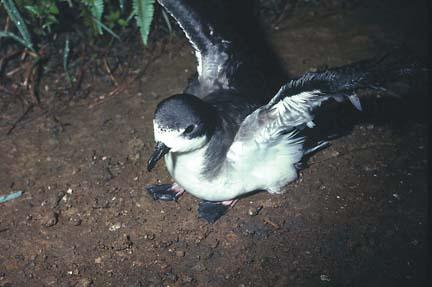LIHU‘E — Failing to implement “common-sense measures” and neglecting to secure an incidental take permit to help mitigate the deaths and injuries to rare native seabirds led conservation groups to file a lawsuit last week against Kaua‘i Island Utility Cooperative,
LIHU‘E — Failing to implement “common-sense measures” and neglecting to secure an incidental take permit to help mitigate the deaths and injuries to rare native seabirds led conservation groups to file a lawsuit last week against Kaua‘i Island Utility Cooperative, court documents show.
Four cultural and environmental groups — Conservation Council for Hawai‘i, Hui Ho‘omalu i Ka ‘Aina, Center for Biological Diversity and American Bird Conservancy — are accusing the co-op of continuing to violate the Endangered Species Act by allowing “unpermitted ‘take’ of federally listed species,” according to the documents supplied by attorneys from Earthjustice.
KIUC was “surprised and disappointed” to learn about the lawsuit, the co-op’s president and CEO, Randy Hee, said Sunday. “If anything, it hinders actions” and diverts KIUC’s attention away from activities that help prevent threatened Newell’s shearwater (‘a‘o) and endangered Hawaiian petrel (‘ua‘u) takes, or inadvertent killings.
“Despite KIUC’s efforts working in the utmost good faith to address issues raised by Earthjustice, they chose to sue, which benefits no one, will cost the ratepayers/member-owners more money in legal fees, and does nothing to advance bird protection,” a press release from the co-op says.
Power lines, streetlights and other utility facilities account for nearly 200 Newell’s shearwater and Hawaiian petrel takes each year, as the structures interfere with the seabirds’ flight path from the mountains to the sea, according to studies supplied by KIUC.
In 2009, the co-op estimated some 87 Newell’s shearwaters were killed by its power lines, including around 17 which were “breeding adults” with chicks that still required parental care.
KIUC also estimated that last year around 70 Newell’s shearwaters were killed by light attraction from its streetlights and other facilities, as the birds become disoriented by the bright lights — confusing them for the moon — and fall to the ground unable to fly again, where loose dogs can kill them.
Overall, Newell’s shearwaters have suffered a 75 percent decline between the years 1993 to 2008. The co-op bears “substantial responsibility,” according to court documents.
When KIUC took over Kaua‘i Electric in 1995, preventative measures were given regarding efforts to mitigate seabird fatalities, but the co-op “failed to bring its operations into compliance with the ESA,” court documents say.
However, KIUC has “worked closely with U.S. Fish and Wildlife and the Hawai’i Department of Land & Natural Resources Division of Forestry and Wildlife” since its inception to “address complex issues,” Hee said. The co-op has also implemented “numerous measures” such as “shielding thousands of streetlights” and providing funding for the Save Our Shearwaters program.
The Conservation Council for Hawai‘i isn’t asking for all the power lines to go underground, just the ones which cross major flyways like Kealia and on the North Shore, said Don Heacock, who is one of some 5,500 members representing the nonprofit.
Burying transmission lines is “very expensive” and labor intensive, Hee said. Efforts to ground wires in Wailua are underway, however, those actions are now expected to be delayed due to the lawsuit, he added.
When asked why Kaua‘i Electric opted not to place wires underground following Hurricane ‘Iniki, Hee said it was likely they were “trying to restore service as quickly as possible.”
These native birds are invaluable and are culturally and ecologically a part of Hawai‘i, Heacock said. Suing is the “last resort.”
KIUC needs to “supply power in a sustainable, ecologically safe manner,” Heacock said. “We’re dealing with species that may go extinct; we don’t have that margin of error.” Things “crash” when biodiversity is low, he added.
Incorporating a holistic approach to economics which includes the environment is essential for the survival of any species, including humans, Heacock said. Losing these Hawaiian birds has a “spillover cost on society as a whole.”
The co-op has every intention of continuing its efforts to mitigate the deaths like working with state and federal wildlife agencies to develop a Habitat Conservation Plan, Hee said.
“The agencies are nearing approval of the plan, and based on their timeline, anticipate issuance of an incidental take permit and license in the third quarter of this year,” says KIUC’s press release.
“KIUC realizes the potential for harm against the seabirds,” Hee said. “We are interested in doing whatever we can.”


